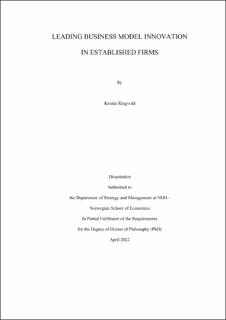LEADING BUSINESS MODEL INNOVATION IN ESTABLISHED FIRMS
Doctoral thesis
Permanent lenke
https://hdl.handle.net/11250/3021260Utgivelsesdato
2022-10Metadata
Vis full innførselSamlinger
Sammendrag
The aim of this dissertation is to explore how established firms innovate their business models,
including the organizational and managerial underpinnings of such innovations. The dissertation
focuses on the following research questions: l) "How do BMI processes unfold in established
firms?" and 2) "How do managers and organizational design best support BMI processes?". I
approach these questions by applying an understanding of business models as cognitive schemas
and activity-based systems. The research design is based on an in-depth, embedded case study of a
multinational corporation experiencing major business model transformation which includes BMI at
different levels (both corporate and business unit). I investigate the process of developing different
types ofBMI, including both modular, customer-oriented BMI, BMI in the form ofreplication to
new markets and corporate-wide BMI. The findings are presented in three subsequent articles
written together with co-authors.
In Article I, we investigate the process of developing a modular BMI within the context of
an established firm. The BMI in focus is a sustainable business model innovation (SBMI), and the
specific research questions for this article addresses how managers, organizational processes and
structure can support the development of SBMI processes. A framework consisting of
microfoundations to support the SBMI process at the individual, interactional and structural level is
developed. Further on, key phases of modular SBMI processes for established firms and their
related microfoundations are discussed, as well as specific aspects of developing SBMI for
established firms.
Article 2 examines the continued relevance of business model replication as a strategy in a
digital context. Characteristics of digital business models are discussed, and findings from an
embedded case study on replication of digital business models is presented. The article suggests
that digital business models require distinct replication strategies supported by a dynamic and
l
2
flexible approach. It argues that replication in dynamic environments is a specific form of BMI, and
that dynamic capabilities are key aspects of the replication approach in the case of digital business
models.
In Article 3, we explore the role of the top management team (TMT) in transforming
business models at the corporate level. This study offers a process perspective that illustrates how
digitalization can trigger a cognitive change with regards to the way the TMT identifies business
model problems, searches for solutions, and introduces change. It argues that TMTs can accelerate
business model transformation processes through building capabilities within business model
problem-identification, -formulation, - recombination and -search.
This dissertation contributes to the business model and the BMI literature by offering an
enhanced understanding of how BMI processes unfold in established firms. It illustrates key
activities and events both in the case of modular BMI processes and corporate level BMI processes,
as well as how managers and organizational characteristics support BMI throughout the process.
